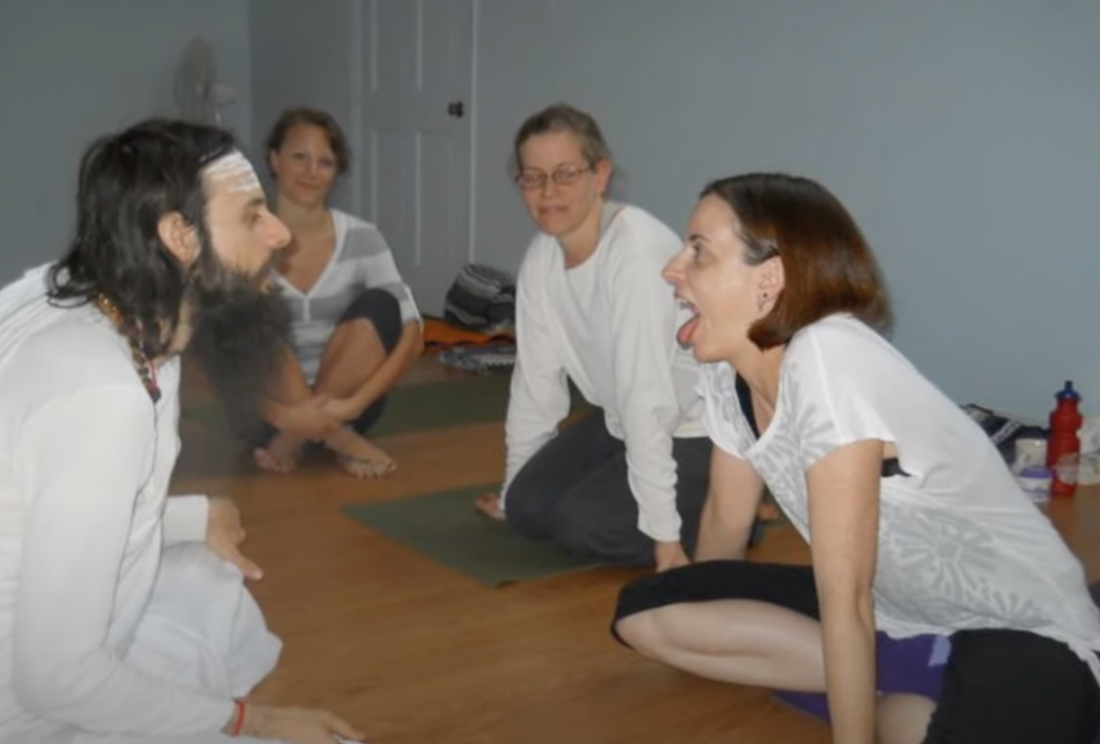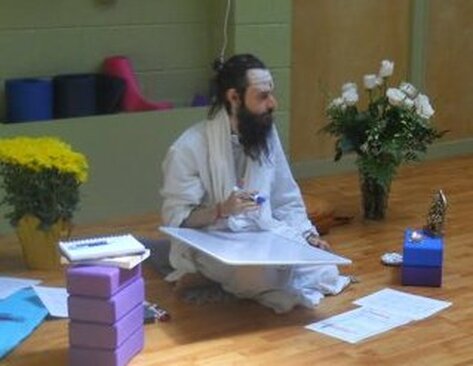Our Commitment to Teaching Traditional Ayurveda
It is our intention to make available affordable and authentic teachings about the traditional and deeply spiritual practice of Ayurveda. As per the traditional methods of teaching Ayurveda, most of these classes are being offered free of charge. For the benefit of the public and to help deepen the practice of Ayurvedic practioners, we are presenting these unique and fascinating offerings. The Soma Matha Spiritual Center is not a registered school, but a traditional gurukulam (a not-for-profit religious organization), working to help preserve the more traditional ways of teaching Ayurveda as its popularity increases in the West.
|
This is a list of Āyurveda classes scheduled by the Soma Matha Spiritual Center for 2023. Some classes are for healing pracitioners or practioners in training only. Others are open to the public. Some classes will be offered online, others require that students physically attend. Some classes have a cost to help us cover our expenses to offer these teachings, others are offered by donation. Some classes have requirements to enrole and students are accepted after review of their application. In some cases, it may be possible to make exceptions to the requirements to enroll.
|
Those physically attending clases, should be aware of our Covid policies. With a couple of acceptions, all classes are subject to a minimum of five or ten participants, or they will be postponed or canceled. If classes are postponed which a person has paid to reister for, they will be offered a full refund. Qustions about our upcoming classes can be sent to [email protected]. Swamiji has 20 years of experience practicing and teaching Ayurveda with clients and students.
|
Upcoming Classes
Nāḍī Nidāna - Basics of Pulse Diagnosis for Āyurvedic Practitioners - at the Center in Schuyler - starting August 1st 2023 - by donation
It is difficult to discern the balance of doshas for a person. Though there are many doshas tests in books and online, our observation teaching Ayurveda to hundreds of individuals over the past 20 years has been that lay people tend to get the doshas wrong at least 50% of the time when using written tests. Even those who had formal training to identify the doshas tend to get them wrong 80% of the time. The surest way to identify the doshas is through the pulse. Though it may be possible to learn to correctly identify a person's predominant dosha with many months or years of clinical experience under the guidance of a qualified Ayurveda doctor, basic pulse diagnosis can be learned relatively quickly and easily, though it does require a bit of practice.
Learn More
Learn More
Taila Kalpanam - Making of Āyurvedic Medicated Oils - at the Center in Schuyler - starting Aug 11th 2023 - $250
Ayurveda has one of the most advance systems of processing herbal medicines, revealed by the Sages and passed down through the generations over hundreds of years. The herbal formulas in Ayurveda are extremely potent medicines unlike most other herbal formulations available. Special preparation techniques are used to empower herbal formulas to have many times the potency of powdered herbs or typical Western herbal preparations. Ayurveda tailams (herbal oils) are a good example of an extremely potent variety of herbal medicine in the Ayurvedic pharmacopoeia. Ayurvedic herbal oils are many hundreds of times more potent than Western infused oils. They do require a great deal of technical knowledge, experience, and a large amount of herbs to make. Learn how to make Ayurvedic tailams to use for healing. Students will learn about the process and then help make traditional mahanarayana tailam. Students will recieve an 8 oz. bottle of oil made in the class.
Learn More
Learn More
Nāḍī Nidāna - Advanced Pulse Diagnosis for Āyurvedic Practitioners - at the Center in Schuyler - Starting September 8th 2023 - by donation
Advanced pulse diagnosis in Ayurveda can provide an immense amount of valuable information about a patient to an Ayurvedic doctor. The condition of the organs, the sapta dhatu, the sub-doshas, and the chakras can be discerned through the pulse. Many conditions like pregnancy, the occurence of miscarriage or abortion, the presence of urinary stones, the presence of mental illness, the genetic predisposition to conditions like heart disease or prostate cancer, broken bones, arthritis and many other conditions can be seen in the pulse. This pulse is very subtle, however. These pulses are so subtle in fact that they can even be read through one's own pulse when a client is distant and their pulse cannot be taken. It requires a great deal of intuition to read these subtle factors from the pulse and a great deal of practice after spiritual initiation for reading the pulse.
Learn More
Learn More
Intro To Ayurveda - In Person or Online - Starting Thu. Nov. 9th - Recommended Donation $150
This course is designed to introduce the basic concepts of Ayurveda. It is suitable for beginners who want to deepen their understanding of Ayurveda and to be able to incorporate the principles of Ayurveda into their own lives for improved health, happiness, and to empower their spiritual practice. Ayurveda is a traditional system of medicine which has been used for thousands of years in India to treat a whole range of health concerns. Many conditions which are currently considered incurable by Western medicine are often cured with Ayurveda. Ayurveda has knowlege to help us to come in alignment with nature to tap into the innate healing ability of the body, mind, and soul. Ayurveda teaches people to understand the signs presented by the body itself to be able to tailor our diet, lifestyle, exercise routine, sleep schedule, work schedule, relationships, and herbal regimens to promote balance. This helps to improve health, happiness and to increase longevity.
Six - 1 1/2 hour classes - plus two live question and answer sessions
Learn More or Register Today
Six - 1 1/2 hour classes - plus two live question and answer sessions
Learn More or Register Today
Basti Treatments in Āyurveda for Healing Practitioners - In-Person - Postponed - by donation
Basti or Vasti in Ayurveda is the term for medicated enemas and also for special treatments pooling medicated oils on specific parts of the body. This course will cover 1 ) kaṭi basti (treatment of the back and hips) 2) nābhi basti (treatment of the belly) 3) hṛdaya basti (treatment of the heart and chest) 4) grīva basti (treatment of the neck and shoulders) 5) skandha basti (treatment of the shoulder) 6) jānu basti (treatment of the knees) 7) netra basti netra tarpaṇam (treatment of the eyes) and 8) śiro basti (treatment of the head). This course does not cover the much more complex subject nirūha basti and anuvāsana basti (medicated enemas). This course will be offered in person only and be open to healing practitioners.The course will cover the basic equipment and materials needed for the procedures, indications and contraindications for the treatments, preparations, the procedure, duration, repetition, variations for the different doshas, and aftercare. Students will learn by performing several of these treatments in a classroom setting. There will be opportunities for students to assist performing and also to receive the various treatments if desired.
Learn More
Learn More
Past Classes
Herbs for Spiritual Awakening in Āyurveda - $150 - Online - Replay Available
The ancient texts on Yoga mention herbs as a potential source for spiritual awakening and for the development of siddhis (mystical powers). Many Indiologists have suggested that these texts refer to narcotic substances. These scholars have tried to understand a very mystical and experiential practice of Yoga through the constructs of logic and Western metaphysics. This has led to a great deal of misunderstanding about the process of spiritual awakening and the properties of herbs. The ancient Ayurvedic texts provide insight into this matter and have recommended specific herbs and herbal forumlas for use to develop siddhis and promote spiritual awareness. Contrary to the belief of the Indiologists, the Ayurvedic texts advise the strict avoidance of intoxicants, especially for those doing spiritual practices, and recommend herbs with vastly different properties to support spiritual awakening. Narcotic substances are tamasic, dulling to the mind. They may be able to increase a person's awareness temporarily and in extremely limitted ways, but their results are unpredictable and unsustainable and the after effects are quite damaging to a person's mental state. When hearing of the mystical powers the great Yogis have attained in their practice, like the ability to travel through space and time, or to be in different places at the same time, or to levitate, or to manipulate mater with the mind, the Indiologists have found these claims hard to believe. Their conclusion has been to assume that the yogis did not actually attain these powers, but were hallucinating. But the Yogis were not hallucinating. They actually attained these and many other mystical powers and awarenesses. Many people in the East have encountered powerful yogis and witness many miraculous seeming events in their presence. These powers cannot be attained through any narcotic substance, but it can be attained through the disciplined practice of Yoga and Japa and Meditation, and certain special sattvic herbs, which support clear perception can be a support to this process. But these herbs are very different from the narcotic substances which all have a long-term effect of dulling one's perception.
Swamiji teaches from his vast knowledge of herbs and from his deep meditative experience about the use of herbs to promote spiritual awakening in Ayurveda with reference to the Charaka Samhita, Ashtanga Hridayam, Bhaishajya Ratnavalli and other tradtional texts of Ayurveda.
Learn More
Swamiji teaches from his vast knowledge of herbs and from his deep meditative experience about the use of herbs to promote spiritual awakening in Ayurveda with reference to the Charaka Samhita, Ashtanga Hridayam, Bhaishajya Ratnavalli and other tradtional texts of Ayurveda.
Learn More
Abhyaṅga - Āyurvedic Massage for Healing Practitioners - Online - by donation
Abhyaṅga is the Āyurvedic treatment applying herbal oils to the body for healing. This technique is different than massage, because the practioner does not work on the muscles and tissues with the hands, but uses the hands to apply herbal oils, which do the healing work. Special techniques and positions are traditionally used in Ayurveda to apply the oils so they penetrate through the pores and deep into the tissues and organs. Abhyanga is said by the Ayurvedic texts to improve health, immunity, strength, flexibility, and longevity, to reduce the effects of stress and aging, to improve circulation, to promote restful sleep and mental peace, among other benefits. This course will provide an introduction to the practice for healing practioners to apply in a clinical setting.
Learn More
Learn More

